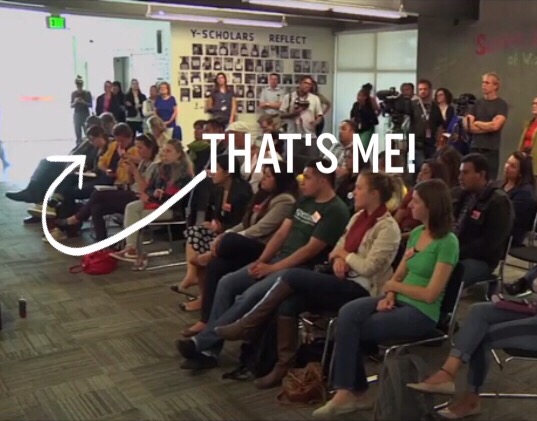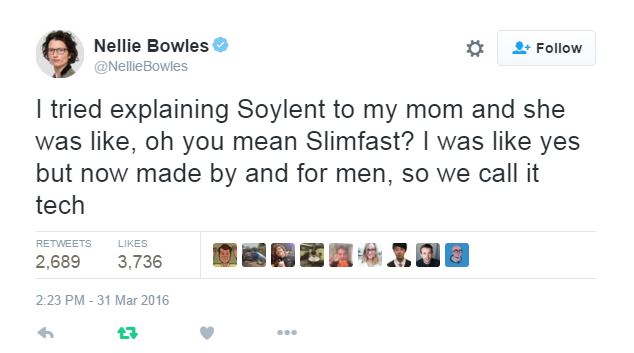…you’re watching Michael Pollan’s In Defense of Food on PBS and suddenly you recognize yourself in the crowd! Watch the discussion of soda politics here.

…you’re watching Michael Pollan’s In Defense of Food on PBS and suddenly you recognize yourself in the crowd! Watch the discussion of soda politics here.


Here’s to 2015!
1. Enjoy more meatless meals. We’ve been gradually eating less and less meat over the past year, and I’m always looking for healthy, meatless meal ideas (i.e., not ones that replace meat with cheese).
2. Waste less food. This means grocery shopping more often during the week, not letting our farmers’ market produce wilt before we can eat it, and finishing our leftovers.
3. Continue advocating for healthy food in my community. I’m attending my first Berkeley Food Policy Council meeting next week and hope to be involved in implementation of the city’s soda tax.
4. Use my cookbooks more often. I read so many food blogs that I get overwhelmed with the sheer number of potential recipes, stick to tried-and-true meals, and forget that I have a bunch of inspiring cookbooks on hand. I’m starting to cook my way through the Smitten Kitchen Cookbook and would love to get Dana Cowin’s new book, Mastering My Mistakes In the Kitchen, and Yotam Ottolenghi’s Plenty.
5. Listen to more food podcasts. I just discovered Radio Cherry Bombe (download on iTunes), which features interviews with women in the food world – recent ones included Ruth Reichl and Ina Garten, who are both delightful. Any other recommendations?
My blogging always falls off the radar when I’m busy. But, this time, I have a good reason – I’m volunteering with the Berkeley vs. Big Soda campaign to pass a tax on sugary drinks in the city of Berkeley, California.
Sugary drinks – like soda, energy drinks, sports drinks, and even juices with added sugar – have repeatedly been linked to increase risk of type 2 diabetes, obesity, and tooth decay. Yet, the beverage industry (aka Big Soda) relentlessly markets these unhealthy drinks despite their harmful health effects. Deceptive marketing most often targets kids and communities of color. As a public health advocate, I truly believe that we need strong policy approaches to address the chronic diseases caused by sugary drinks – educational campaigns on the topic just aren’t sufficient to reduce soda consumption when people are inundated with Big Soda’s targeted marketing.
Berkeley is proposing a tax on distributors of sugary drinks to tell Big Soda that we won’t let them profit at the expense of our community’s health any longer. Revenue from the tax could be used to fund community- and school-based obesity prevention programs. We also hope that by raising awareness of the issue of soda-related diseases, Berkeley’s families and residents will rethink their beverage choices and sugary drink consumption will decline over time.
I encourage you to visit our website and follow us on social media to learn what we’re all about:
If you happen to be a local reader, please volunteer and donate. The decision on the ballot measure will be finalized at the Berkeley City Council meeting on June 24th. Let’s make Berkeley the first city in the U.S. to pass a tax on sugary drinks!
UPDATE: As of July 1st, the Berkeley soda tax (now known as Measure D) is officially on the November ballot!
As part of National Public Health Week, the American Public Health Association is hosting a 4-part webinar series on food, justice, and health equity. The first in the series is this Thursday, April 10th on “Food justice, Obesity & the Social Determinants of Health.” Speakers include Shiriki Kumanyika, PhD, MPH APHA President-Elect and Cecilia Martinez, PhD, Center for Earth, Energy & Democracy.
Here’s the description of this week’s webinar from APHA: Healthy communities depend on food environments that allow for access to healthy food. Where you live should not dictate how well you eat, or how that food is grown, but it often does. APHA President Elect, Shiriki Kumanyika, PhD, discusses food environments as drivers of obesity and related diseases, as well as critical elements in achieving health equity. Respondent Dr. Cecelia Martinez of the Center for Earth, Energy and Democracy (CEED) will discuss community indicators for food justice.
Register here for the 4-part webinar series. Be sure to check out the other events on the NPHW website!
 Michael Pollan will be speaking in San Francisco on May 1st in a lecture entitled, “The Omnivore’s Solution: In Defense of Food.”
Michael Pollan will be speaking in San Francisco on May 1st in a lecture entitled, “The Omnivore’s Solution: In Defense of Food.”
Here’s the event description from City Arts:
For the past twenty years, Michael Pollan has been writing books and articles about the places where the human and natural worlds intersect: food, agriculture, gardens, drugs and architecture. An “ethical-eating guru” and fierce advocate of sustainable agriculture and living, Pollan is one of the most compelling voices on subjects ranging from environment to business to health. He is the author of In Defense of Food: An Eater’s Manifesto, The Omnivore’s Dilemma: A Natural History of Four Meals, The Botany of Desire: A Plant’s-Eye View of the World, Food Rules: An Eater’s Manual, and Cooked: A Natural History of Transformation. Pollan teaches at the UC Berkeley Graduate School of Journalism. This program is a lecture titled The Omnivore’s Solution: In Defense of Food.
Buy tickets here soon!
In case you missed it this past weekend, or weren’t able to attend a viewing party, catch up on TEDx Manhattan’s Changing the Way We Eat by watching all the videos here. Speakers included Michel Nischan (of Wholesome Wave), chef Tom Colicchio, and Congresswoman Chellie Pingree (D-ME) (you can check out the full schedule here).